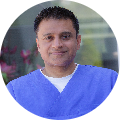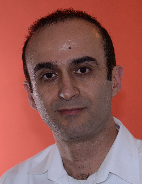
Oral surgery in Vienna β Professional surgical procedures
All dentists with available appointment times are listed here. Super easy booking with just one click!
Dr.dent.
Insurances: Dentist of Choice , Private Practice
Clinic: Aventurin dental practice
Address:
Graben 31,Top 11
1010 Vienna
Featured for
- Tooth whitening and dental bleaching in Vienna
- Dental implants in Vienna
- Dental inlay
-
Tooth whitening and dental bleaching in Vienna
-
Dental implants in Vienna
- Dental inlay
Dr.med.dent.
Insurances: Dentist of Choice , Private Practice
Address:
Donau City Dental
Wagramer Str. 4
Zwischengeschoss/Mezzanine
(im Hochhaus Neue Donau)
1220 Vienna
Austria
Show Specialties
- Private Practice Dentist
- Private dentist in Vienna β Individual & flexible dental treatment
- Dental Radiology in Vienna β Modern Dental Diagnostics
- Endodontics in Vienna β gentle & precise root canal treatment
- Pediatric dentistry in Vienna β Gentle dental treatment for children
- Periodontology
- Implantology in Vienna β Dental implants for a firm bite
- Prosthetics in Vienna β High-quality dental prosthetics for your smile
- Oral surgery in Vienna β Professional surgical procedures
- Prevention
- General dentistry in Vienna β Comprehensive dental care
Insurances: Private Practice
Address:
Beatrixgasse 3
1030 Vienna
Austria
Show Specialties
- Private Practice Dentist
- Private dentist in Vienna β Individual & flexible dental treatment
- Dental Radiology in Vienna β Modern Dental Diagnostics
- Endodontics in Vienna β gentle & precise root canal treatment
- Periodontology
- Implantology in Vienna β Dental implants for a firm bite
- Prosthetics in Vienna β High-quality dental prosthetics for your smile
- Oral surgery in Vienna β Professional surgical procedures
- Prevention
- General dentistry in Vienna β Comprehensive dental care
Dr.Dent.Med.
Insurances: Dentist of Choice , Private Practice
Address:
Rögergasse 32/1-3
1090 Vienna
Austria
Show Specialties
- Private Practice Dentist
- Private dentist in Vienna β Individual & flexible dental treatment
- Dental Radiology in Vienna β Modern Dental Diagnostics
- Endodontics in Vienna β gentle & precise root canal treatment
- Pediatric dentistry in Vienna β Gentle dental treatment for children
- Periodontology
- Implantology in Vienna β Dental implants for a firm bite
- Removable orthodontics in Vienna β Flexible braces
- Fixed orthodontics in Vienna β Effective tooth correction
- Prosthetics in Vienna β High-quality dental prosthetics for your smile
- Oral surgery in Vienna β Professional surgical procedures
- Prevention
- General dentistry in Vienna β Comprehensive dental care
Insurances: All Insurances , ΓGK , SVS , BVAEB , KFA
Address:
Zahnarztpraxis Dr. Sablania
Spezialisten-Zahnspange, Implantate
Ordination / Forsthausgasse 16-20, Stiege 3, EG, 1200 Wien,
Alle Kassen und Privat
Mo - Fr : 10 - 17 Uhr
1200 Vienna
Austria
Show Specialties
- Dental Radiology in Vienna β Modern Dental Diagnostics
- Endodontics in Vienna β gentle & precise root canal treatment
- Pediatric dentistry in Vienna β Gentle dental treatment for children
- Periodontology
- Implantology in Vienna β Dental implants for a firm bite
- Removable orthodontics in Vienna β Flexible braces
- Fixed orthodontics in Vienna β Effective tooth correction
- Prosthetics in Vienna β High-quality dental prosthetics for your smile
- Oral surgery in Vienna β Professional surgical procedures
- Prevention
- General dentistry in Vienna β Comprehensive dental care
Dr.med.dent.
Insurances: Private Practice
Address:
Südtiroler Platz 7/10
1040 Vienna
Austria
Show Specialties
- Private Practice Dentist
- Dental Radiology in Vienna β Modern Dental Diagnostics
- Endodontics in Vienna β gentle & precise root canal treatment
- Pediatric dentistry in Vienna β Gentle dental treatment for children
- Periodontology
- Implantology in Vienna β Dental implants for a firm bite
- Removable orthodontics in Vienna β Flexible braces
- Fixed orthodontics in Vienna β Effective tooth correction
- Prosthetics in Vienna β High-quality dental prosthetics for your smile
- Oral surgery in Vienna β Professional surgical procedures
- Prevention
- General dentistry in Vienna β Comprehensive dental care
Insurances: SVS , KFA , Dentist of Choice , Private Practice
Address:
Porzellangasse 27/7A
1090 Vienna
Austria
Show Specialties
- Private Practice Dentist
- Private dentist in Vienna β Individual & flexible dental treatment
- Dental Radiology in Vienna β Modern Dental Diagnostics
- Endodontics in Vienna β gentle & precise root canal treatment
- Pediatric dentistry in Vienna β Gentle dental treatment for children
- Periodontology
- Implantology in Vienna β Dental implants for a firm bite
- Removable orthodontics in Vienna β Flexible braces
- Fixed orthodontics in Vienna β Effective tooth correction
- Prosthetics in Vienna β High-quality dental prosthetics for your smile
- Oral surgery in Vienna β Professional surgical procedures
- Prevention
- General dentistry in Vienna β Comprehensive dental care
Dr.dent.
Insurances: Dentist of Choice , Private Practice
Clinic: Aventurin dental practice
Address:
Graben 31,Top 11
1010 Vienna
Austria
Show Specialties
- Private Practice Dentist
- Private dentist in Vienna β Individual & flexible dental treatment
- Dental Radiology in Vienna β Modern Dental Diagnostics
- Endodontics in Vienna β gentle & precise root canal treatment
- Periodontology
- Implantology in Vienna β Dental implants for a firm bite
- Prosthetics in Vienna β High-quality dental prosthetics for your smile
- Oral surgery in Vienna β Professional surgical procedures
- Prevention
- General dentistry in Vienna β Comprehensive dental care
Dr.
Insurances: All Insurances , ΓGK , SVS , VA , PVA , BVAEB , KFA , Private Practice
Address:
Hauptstraße 39
7372 DraΓmarkt, Burgenland
Austria
Show Specialties
- Private Practice Dentist
- Dental Radiology in Vienna β Modern Dental Diagnostics
- Endodontics in Vienna β gentle & precise root canal treatment
- Pediatric dentistry in Vienna β Gentle dental treatment for children
- Implantology in Vienna β Dental implants for a firm bite
- Removable orthodontics in Vienna β Flexible braces
- Fixed orthodontics in Vienna β Effective tooth correction
- Prosthetics in Vienna β High-quality dental prosthetics for your smile
- Oral surgery in Vienna β Professional surgical procedures
- Prevention
- General dentistry in Vienna β Comprehensive dental care
Medic.Dent., MSc
Insurances: SVS , KFA , Dentist of Choice , Private Practice
Address:
Leonard-Bernstein Straße 8/1/EG6
1220 Vienna
Austria
Show Specialties
- Private Practice Dentist
- Private dentist in Vienna β Individual & flexible dental treatment
- Dental Radiology in Vienna β Modern Dental Diagnostics
- Endodontics in Vienna β gentle & precise root canal treatment
- Periodontology
- Implantology in Vienna β Dental implants for a firm bite
- Removable orthodontics in Vienna β Flexible braces
- Fixed orthodontics in Vienna β Effective tooth correction
- Prosthetics in Vienna β High-quality dental prosthetics for your smile
- Oral surgery in Vienna β Professional surgical procedures
- Prevention
- General dentistry in Vienna β Comprehensive dental care
Dr.med.dent., Msc
Insurances: ΓGK , SVS , VA , PVA , BVAEB , KFA , Private Practice
Address:
Burggasse 105/2
1070 Vienna
Austria
Show Specialties
- Private Practice Dentist
- Dental Radiology in Vienna β Modern Dental Diagnostics
- Endodontics in Vienna β gentle & precise root canal treatment
- Pediatric dentistry in Vienna β Gentle dental treatment for children
- Periodontology
- Implantology in Vienna β Dental implants for a firm bite
- Fixed orthodontics in Vienna β Effective tooth correction
- Prosthetics in Vienna β High-quality dental prosthetics for your smile
- Oral surgery in Vienna β Professional surgical procedures
- Prevention
- General dentistry in Vienna β Comprehensive dental care
What is oral surgery?
Oral surgery is the specialty in dental medicine that deals with surgical interventions inside the oral cavity. Procedures that fit into this specialty are, among others, tooth extractions, operations on the jaw to correct serious dental misalignments, and operations on soft tissue inside the oral cavity. Since the need for such surgical interventions is usually determined by a general dentist, most of an oral surgeon's patients come from referrals from general dentists and only a very small fraction of them find their way directly to the oral surgeon from the get-go.The specialty of periodontal-surgery, which focuses on the operative treatment of periodontitis and other bacterial inflammations of the gums, also falls into the realm of oral surgery. Since oral surgeries carry a relatively high level of risk with them, general dentists, who aim to become oral surgeons, need to complete a 4-year long special training, including a 2 year-long medical internship in a clinic, in order to receive a license as an oral surgeon.
What are the most frequently performed oral surgery procedures?
Some of the most important interventions that fall into the realm of oral surgery are related to tooth extractions and operations on tooth roots and include the following procedures:- Tooth extractions
- Osteotomy (removal of dental remnants)
- Tooth root amputation (removal of the dental root through the jaw bone)
- Dental transplants
- Dental re-implantations
- Surgeries prior to the insertion of prosthetic devices (e.g., dentures)
- Surgical periodontal therapies
- Bone augmentations (also called augmentations)
- Dental implants
- Wisdom tooth removals
- Tumor removals
- Lip corrections
- Corrections of the lingual frenum
- Cystotomies
- Cystectomies
How does an oral surgery procedure progress?
Oral surgery procedures are performed in a separate room (also called OP area). Many surgical procedures happen under local anesthesia, though some require the use of heavier forms of sedation, or even general anesthesia.Prior to a surgical procedure, an oral surgeon must first gain a clear understanding of the exact medical emergency of his or her patient via several diagnostic tools. The most widely used one is still the 2-dimensional x-ray. In difficult cases, a dentist may also resort to the use of newer technologies, such as digital, 3-dimensional x-ray machines. Pictures from such machines are usually used to support bone augmentation procedures. Diagnostic x-ray machines are usually situated in a separate room and, once combined with modern treatment planning software, offer patients and dentists the highest possible degree of safety by providing high-resolution, digital x-ray images based on which a dentist can make better treatment decisions, which decreases any procedure risks significantly. Due to the high degree of complexity of these modern x-ray machines, oral surgeons need to obtain additional educational credentials to certify their capability to use them for treatment diagnostics.
After a successful diagnosis of a patient's medical situation, many oral surgeons opt for minimally invasive surgical techniques to minimize incisions to skin and soft tissue during an operation. This minimizes the pain that a patient may feel during such a procedure and significantly reduces healing time.
How does a dentist become an oral surgeon?
As already mentioned, the training of an oral surgeon takes four years for a general dentistry curriculum as well as four more years of additional schooling to become a certified oral surgeon. During the entire course of study, an oral surgeon in the making is not allowed to open his or her own practice in order to not detract from the quite intensive coursework. Though details of training schedules may differ, depending on which regional dental chamber an oral surgeon works under, the main topics of study include the following:- Operative interventions to lower and upper jaws, the oral mucosa, and the gums
- Inflammation-alleviating interventions to the face and the jaws
- Treatments of damages and injuries inside the oral cavity (including the jaws)
- Clinical diagnostics in a lab, x-ray pictures, and anesthesia
After finishing up a complete course of study in the field of oral surgery, a graduate not only has full command of all treatment methods that general dentistry has to offer, but also possesses all of the additional skills of an oral surgeon. After a successfully passed final exam, the newly-minted oral surgeon may open his or her own practice and start treating new patients in the fields of general dentistry and oral surgery.
We hope that you found this primer helpful and you can take a look at our blog as well as at the following landing pages for more information:
All the Best & see you soon, Ace!










